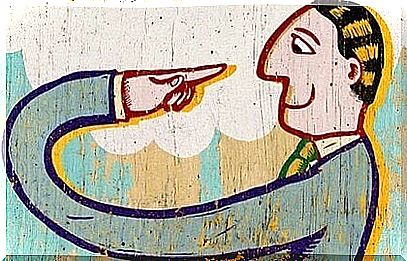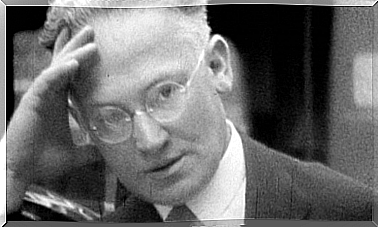Asking Forgiveness And Fixing Mistakes, Two Things A Narcissist Will Never Do

The narcissistic person can appear charming, self-confident and even attentive when they have a goal in mind. However, there is one thing she hardly ever does, and even more about her relationship. That of asking for forgiveness. To recognize his faults. And to fix his mistakes. Experts tell us that this is due to their egocentric and domineering attitude that does not harbor the slightest hint of empathy.
In our relationships of friendship, couple, work and family, disagreements and occasional conflicts are usual. What is more, and almost without realizing it, we can sometimes offend or hurt someone. In this case, we do not hesitate to sincerely apologize in order to rebuild this bond and learn from what happened. The goal is not to repeat the same mistakes.
Thus, greater social and emotional intelligence does not just mean asking for forgiveness, but doing it in the most effective way possible. The person skilled in these skills will thus show great emotional openness, unfailing sincerity and a clear desire to right his wrongs.
But what happens in the case of narcissistic people? Studies like the one by Joost M. Leunissen and Constantine Sedikides of the University of Nottingham tell us this very clearly. This type of profile does not always feel guilty after his transgressions.
Therefore, even if this person feels a social pressure which pushes him to rectify this situation, the fact of admitting his wrongs causes him great contradiction, resistance and even suffering. Why ? Because that would involve making his ego vulnerable. Let’s take a closer look.

Narcissists and make it to beg for forgiveness
Masterson (1981) reminds us that this profile goes from a point that we consider normal (where there is a more or less adequate regulation of self-esteem) to an already pathological extreme that defines the disorder. the narcissistic personality.
In the latter case, these people need to build and protect the image of a clearly oversized “me”. With this “me”, they manage to protect this internal piece so weak and fractured: self-esteem. They therefore aspire to give an image of formidable efficiency, perfection and sufficiency.
But what happens when a narcissist commits a transgression? What happens when, for example, her spouse reproaches her for her disrespect, negative words, selfishness or lack of attention? In reality, it is very simple: the narcissist cannot take responsibility for these faults. To do so would be to come into conflict with that image of perfection that he strives to maintain.

The narcissist wants “mirror” people in whom he can reflect and does not admit contradictions
Andrew P. Morrison is one of the foremost experts on the narcissistic personality. Thus, in his introduction to Essential Papers on Narcissism, he tells us that narcissists are above all looking for “mirror” people.
- The narcissist prefers this type of relationship where the other party is limited to reflecting his qualities. She wants, to put it more simply, that others act as the magic mirror of the mother-in-law of Snow White, who repeated to her every day that she was the most beautiful in the kingdom.
- If at any time this mirror begins to tell him about his faults, mistakes and wrongs, the narcissist will hardly be able to apologize.
- She won’t do it because she doesn’t feel guilty. In the case of narcissistic personality disorder, it is usual for empathy to be very low. Therefore, the person does not understand that the other person is hurt or concerned.
- Also, since this profile understands relationships as simple links or transactions that will bring him benefits, he can tell the other person that it’s just his problem.
These dynamics, as we can imagine, can be extremely harmful within a couple.
The narcissist will make you believe the mistake is on you
We know that in general, asking for an apology is a step that the narcissist will not take. However, something even more complex and contradictory could happen.
- This type of personality, even though we don’t believe it, suffers a lot. The narcissist suffers intensely because he always feels frustrated and bitter. Her low self-esteem continually places her on this battlefield where she tries to shine with the most golden armor and the most beautiful of crowns.
- This need to feign perfection, efficiency and sufficiency often comes face to face with a reality that does not tolerate this type of attitude.
- At the couple level, one thing happens very frequently: when the other person asks them to apologize for a concrete situation, the narcissist makes them believe that they are responsible for it. Because she doesn’t understand, because she doesn’t see things the same way, because she is weak, ignorant. ..
So, and almost without realizing it, the situation can be reversed. Let’s not forget that people with narcissistic personality disorder are adept at manipulation. So it is very likely that we will end up asking their forgiveness.
What to do with narcissists who don’t want to apologize?
You should know that there are many types of narcissists. This disorder ranges from a lower intensity to a high intensity. We can for example mention psychopathic narcissists. In this case, it is about profiles who pretend to be normal and functional but who do a lot of harm to others on an emotional level.
- Narcissists need specialized help. They need a therapeutic intervention that allows them to work on aspects such as antisocial reasoning, self-esteem, the illusion of superiority, acceptance of one’s imperfections, empathy… They must be fully aware of the evil that they do through their behaviors and attitudes.
- On our side, in this daily relationship with a narcissist who refuses to ask for forgiveness, there are only two possible options. Either there is respect, or there is not. Either we offer him an opportunity for change with the help of an expert or we consider the possibility of establishing a distance with him.
In many cases, and depending on each narcissistic personality subtype, progress and improvement can take place. So let’s not lose hope. If we have a loved one, spouse, or friend with this trait, let’s try to make them aware of the impact of their behavior. Let’s make sure he gets help.










